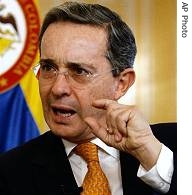-
(单词翻译:双击或拖选)
Washington
09 May 2007
Colombian politicians and human rights activists2 visiting Washington this week say U.S. aid to their country focuses too much on military and anti-drug assistance and not enough on humanitarian3 needs. The delegation4 is drawing attention to Colombia's 3.5 million refugees and internally displaced people, as estimated by the U.N. refugee agency. VOA's Michael Bowman reports Congress is examining continued funding of Plan Colombia, an initiative that focuses on combating the drug trade, boosting the country's military, and creating favorable economic and social conditions for ending Colombia's decades-old civil war.
Colombia is the fourth-largest recipient5 of U.S. foreign aid, behind Iraq, Israel, and Egypt, with more than $4 billion in assistance flowing to Bogota since 2000.
During a visit to Colombia in March, President Bush highlighted U.S. efforts to promote prosperity and bring about positive social change in the country long plagued by drug-financed leftist guerrillas and rightwing paramilitary groups. Standing6 alongside President Alvaro Uribe, Mr. Bush also seemed to answer critics who say that three of every four U.S. aid dollars spent in Colombia go to anti-narcotics efforts and military assistance.
 |
| Colombia's President Alvaro Uribe speaks during an interview with The Associated Press in Bogota, 08 May 2007 |
The U.S. aid has not been without positive results, according to Eduardo Zúñiga, governor of Colombia's remote southwestern Nariño department. Zúñiga says overall security has improved somewhat in Nariño since Plan Colombia's inception7 in the late 1990s.
But the governor, who is visiting Washington, says the drug trade continues to flourish, and bloodshed remains8 all too common, with innocent civilians9 paying a heavy price.
"In the year 2000, there were 1,900 refugees in my department. In 2006, there were 55,000 displaced people, and currently we estimate we are approaching a total of 70,000," he said.
Just last month, a battle between leftist rebels and the armed forces caused thousands to flee a rural village in Nariño. Whether the villagers will ever return is an open question.
Zúñiga says Plan Colombia is a net positive for his country, but that the program could stand improvement.
"It is necessary to change the policy," he said. " I think it is necessary to spend less on the military side, without neglecting it, of course, but placing the emphasis on the social side."
Human rights workers accompanying Zúñiga say more than half of Colombia's internally displaced people are under the age of 20. Most come from the countryside and end up in the slums of major urban areas. Often unable to find work, they live on the margins10 of society, adding to Colombia's already sizable underclass.
The government of President Uribe says it is investing nearly $1 billion to promote social development and combat the effects of civil war, including backing organizations that assist internally displaced people. In addition, the government says those touched by violence will be entitled to reparations.
But Colombian human rights activist1 Marco Alberto Romero accuses Mr. Uribe of downplaying the magnitude of the crisis of internally displaced people, and says the government has proven itself incapable11 of delivering on social promises.
He says, regardless of how much is spent to eradicate12 coca leaf crops and to train and equip Colombia's armed forces, little will be accomplished13 so long as basic humanitarian needs go unmet.
"Building peace is not easy. We have years of pursuing it through military means. We think that providing solutions for peasants is a good alternative for controlling the drug trade and resolving the war," said Romero. " If we do not resolve the problem of the misery14 suffered by poor people, and if the war continues, conditions favorable to the drug trade will continue to exist."
Some Democrats15 in the opposition-controlled U.S. House of Representatives are pushing for an overhaul16 of U.S. aid to Colombia along the lines suggested by Romero and Governor Zúñiga.
Meanwhile, a bilateral17 free-trade pact18 negotiated by the Bush and Uribe administrations faces an uncertain future in the U.S. Congress, which must approve the measure for it to go into effect. Analysts19 say, with Iraq war funding and other matters taking center stage at present, it is unlikely the legislature will vote on the measure in the foreseeable future.
 收听单词发音
收听单词发音
1
activist

|
|
| n.活动分子,积极分子 | |
参考例句: |
|
|
|
2
activists

|
|
| n.(政治活动的)积极分子,活动家( activist的名词复数 ) | |
参考例句: |
|
|
|
3
humanitarian

|
|
| n.人道主义者,博爱者,基督凡人论者 | |
参考例句: |
|
|
|
4
delegation

|
|
| n.代表团;派遣 | |
参考例句: |
|
|
|
5
recipient

|
|
| a.接受的,感受性强的 n.接受者,感受者,容器 | |
参考例句: |
|
|
|
6
standing

|
|
| n.持续,地位;adj.永久的,不动的,直立的,不流动的 | |
参考例句: |
|
|
|
7
inception

|
|
| n.开端,开始,取得学位 | |
参考例句: |
|
|
|
8
remains

|
|
| n.剩余物,残留物;遗体,遗迹 | |
参考例句: |
|
|
|
9
civilians

|
|
| 平民,百姓( civilian的名词复数 ); 老百姓 | |
参考例句: |
|
|
|
10
margins

|
|
| 边( margin的名词复数 ); 利润; 页边空白; 差数 | |
参考例句: |
|
|
|
11
incapable

|
|
| adj.无能力的,不能做某事的 | |
参考例句: |
|
|
|
12
eradicate

|
|
| v.根除,消灭,杜绝 | |
参考例句: |
|
|
|
13
accomplished

|
|
| adj.有才艺的;有造诣的;达到了的 | |
参考例句: |
|
|
|
14
misery

|
|
| n.痛苦,苦恼,苦难;悲惨的境遇,贫苦 | |
参考例句: |
|
|
|
15
democrats

|
|
| n.民主主义者,民主人士( democrat的名词复数 ) | |
参考例句: |
|
|
|
16
overhaul

|
|
| v./n.大修,仔细检查 | |
参考例句: |
|
|
|
17
bilateral

|
|
| adj.双方的,两边的,两侧的 | |
参考例句: |
|
|
|
18
pact

|
|
| n.合同,条约,公约,协定 | |
参考例句: |
|
|
|
19
analysts

|
|
| 分析家,化验员( analyst的名词复数 ) | |
参考例句: |
|
|
|















